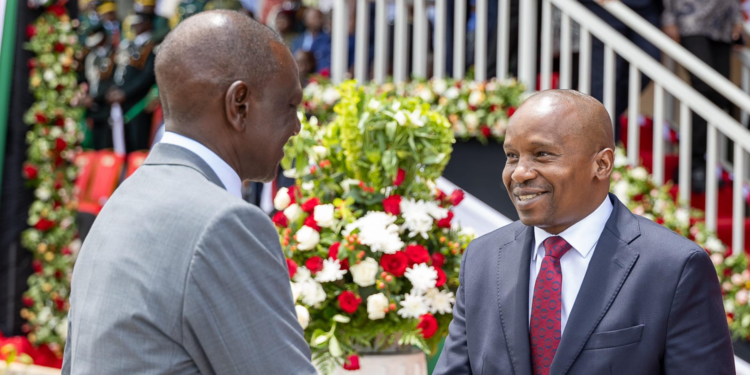A three-judge bench of Kenya’s High Court ruled to lift conservatory orders preventing the swearing-in of Professor Kithure Kindiki as Deputy President, citing the critical need to uphold constitutional integrity. The ruling, delivered by Justice Anthony Mrima, who served alongside Justices Eric Ogola and Fredah Mugambi, dismissed Gachagua’s request to halt Kindiki’s assumption of office.
The petitioners argued for conservatory orders, claiming that proceeding with Kindiki’s appointment would nullify their right to challenge the impeachment process. Justice Mrima, reading the bench’s verdict, affirmed the constitutional necessity of maintaining a fully functional government and stated, “No court should issue orders that have the effect of suspending the operation of any provision of the Constitution.” The court maintained that leaving the office of the Deputy President vacant would create a constitutional void, an outcome it deemed unacceptable under Kenya’s 2010 Constitution.
Constitutional Integrity at Stake
The court’s ruling emphasized that its decision was grounded in Kenya’s constitutional framework, specifically referencing Article 147, which assigns specific functions to the Deputy President. Justice Mrima argued that issuing conservatory orders to prevent Kindiki’s appointment would effectively “suspend Article 147(2) of the Constitution,” thereby disrupting the government’s operational structure. “The Constitution is structured to ensure that all its provisions are effective and operative at all times,” Mrima stated. The bench further highlighted the Constitution’s status as a living document, asserting that any judicial decision should align with its continuous application and interpretation.
In dismissing the petition, the court also referenced Article 259, which mandates that the Constitution be applied consistently to meet contemporary challenges. Justice Mrima remarked, “The Constitution was not handed to Kenyans on a silver platter; it was achieved through great struggle and sacrifice,” underscoring the judiciary’s role in preserving the Constitution’s provisions as envisioned by its framers.
Safeguarding Constitutional Processes
Addressing the petitioners’ fears that their rights to contest the impeachment could be compromised if Kindiki took office, the court reassured them of alternative remedies. It affirmed that should the petitions ultimately succeed, there would be ample legal recourse to address any resulting concerns. The court held that “no individual can suffer loss or damage when the Constitution is permitted to operate as intended,” emphasizing that allowing the constitutional process to proceed aligns with the rule of law.
The petitioners had also expressed concerns over the government’s historical record of court order compliance, noting potential risks if the conservatory orders were denied. In response, the court asserted that the judiciary must not operate under assumptions of non-compliance, emphasizing, “This country has legal mechanisms to address any acts of disobedience of court orders.” The Attorney General, through Senior Counsel Professor Githu Muigai, assured full compliance with any orders issued, a guarantee the court deemed satisfactory in addressing potential grievances.
Public Interest and Swift Proceedings
The ruling also reiterated the significant public interest surrounding the matter, with the court noting the importance of an expeditious examination of the petitions. Justice Ogola, the lead judge, scheduled the next hearing for November 7, 2024, adding that the court would issue further directions at that time. “We remain committed to an expeditious examination of the petitions,” stated Ogola, signaling the bench’s intent to resolve the case without undue delay.
The court’s firm stance against conservatory orders aligns with the broader judicial principle of constitutional supremacy. This doctrine, highlighted in the ruling, stresses that all judicial decisions must support the Constitution’s objectives and avoid suspending any of its provisions. The bench noted, “Issuing an order that suspends a constitutional provision would directly contravene this principle,” reiterating the judiciary’s duty to uphold constitutional integrity.
This ruling, which discharged the conservatory orders issued earlier on October 18, 2024, effectively clears the path for Prof. Kindiki to assume office.
















